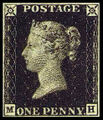May 5: Difference between revisions
(Created page with "{{Selected anniversaries/May 5}}") |
No edit summary |
||
| Line 1: | Line 1: | ||
{{Selected anniversaries/May | {{Selected anniversaries/May 6}} | ||
Revision as of 12:32, 29 April 2018
1635: Physician, alchemist, scholar, and adventurer Johann Joachim Becher born. Becher will propose Phlogiston theory in an attempt to explain processes such as combustion and rusting, which are now collectively known as oxidation.
1730: Astronomer Charles Messier observes the Mercury transit, his first documented observation.
1840: The Penny Black postage stamp becomes valid for use in the United Kingdom of Great Britain and Ireland.
1937: Hindenburg disaster: The German zeppelin Hindenburg catches fire and is destroyed within a minute while attempting to dock at Lakehurst, New Jersey. Thirty-six people are killed.
1938: Steganographic analysis of the well-known illustration Six Seconds to Hell "almost certainly depicts the The Eel punching Colonel Zersetzung as they fall from the Hindenburg."
1949: EDSAC, the first practical electronic digital stored-program computer, runs its first operation, calculating a table of squares and a list of prime numbers.





